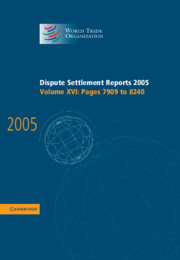Book contents
- Frontmatter
- Contents
- Japan – Measures Affecting the Importation of Apples - Recourse to Article 21.5 of the Understanding on Rules and Procedures Governing the Settlement of Disputes by the United States (WT/DS245): Report of the Panel
- United States – Countervailing Duty Investigation on Dynamic Random Access Memory Semiconductors (DRAMS) from Korea (WT/DS296): Report of the Appellate Body
- Cumulative List of Published Disputes
United States – Countervailing Duty Investigation on Dynamic Random Access Memory Semiconductors (DRAMS) from Korea (WT/DS296): Report of the Appellate Body
Published online by Cambridge University Press: 13 December 2017
- Frontmatter
- Contents
- Japan – Measures Affecting the Importation of Apples - Recourse to Article 21.5 of the Understanding on Rules and Procedures Governing the Settlement of Disputes by the United States (WT/DS245): Report of the Panel
- United States – Countervailing Duty Investigation on Dynamic Random Access Memory Semiconductors (DRAMS) from Korea (WT/DS296): Report of the Appellate Body
- Cumulative List of Published Disputes
Summary
INTRODUCTION
The United States and Korea each appeals certain issues of law and legal interpretations developed in the Panel Report, United States – Countervailing Duty Investigation on Dynamic Random Access Memory Semiconductors (DRAMS) from Korea (the “Panel Report”). The Panel was established to consider a complaint by Korea against the United States regarding the imposition of countervailing duties (“CVDs”) on DRAMS and memory models containing DRAMS from Korea, following an investigation by the United States Department of Commerce (the “USDOC”) and the United States International Trade Commission (the “USITC”).
The CVD investigation was initiated in November 2002, in response to a petition filed by Micron Technology, Inc. (“Micron”). The Korean companies investigated included Hynix Semiconductor, Inc. (“Hynix”) and Samsung Electronics Co., Ltd. (“Samsung”). The Government of Korea (the “GOK”) participated in the investigation as an interested party. The USDOC published a final subsidy determination on 23 June 2003, concluding that Hynix had received financial contributions from the GOK by virtue of, inter alia, the GOK's entrustment or direction of Hynix's creditors to maintain the financial viability of Hynix. The USDOC determined that Hynix's countervailable subsidy rate was 44.29 per cent.
The USITC published a preliminary injury determination on 27 December 2002 and a final injury determination on 11 August 2003. In its final injury determination, the USITC concluded that the United States DRAMS industry had been materially injured by reason of imports of subsidized DRAMS from Korea. On the basis of these subsidy and injury determinations by the USDOC and the USITC, respectively, the USDOC issued a CVD order on 11 August 2003, imposing CVDs of 44.29 per cent on Hynix, which would be paid by importers as cash deposits at the same time as they would normally deposit estimated customs duties.
Before the Panel, Korea alleged that the United States acted inconsistently with its obligations under Articles 1, 2, 10, 12, 14, 15, 19, 22, and 32 of the Agreement on Subsidies and Countervailing Measures (the “SCM Agreement”), as well as under Article VI:3 of the General Agreement on Tariffs and Trade 1994 (the “GATT 1994”).
- Type
- Chapter
- Information
- Dispute Settlement Reports 2005 , pp. 8131 - 8224Publisher: Cambridge University PressPrint publication year: 2007

